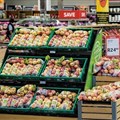Over the past year, Ella, a South African blend of espresso and milk, has been working to get its product to the Middle East.
“The per capita income in the Middle East is one of the highest in the world, and our research showed us that they are paying one of the highest prices in the world for premium coffee – for example, in Qatar, you can pay $6.50 for a cappuccino,” explains Ella founder Neil Hellmann.
“The fact that our product has a year’s shelf life adds to its convenience. And because it has more than 75% milk in it, it is exempt from sugar tax/excise duty in the Middle East and so it gives us an advantage over other energy drinks who have to pay large excise duties,” Hellman continues.
Setting up a product for export is a long process and has been made even more onerous because the product contains milk.
“We have had our labels approved, we have our Halaal certification and we have our export permit from the Department of Veterinary Science. Because it contains milk (live animal produce) it makes it a difficult certification to acquire. But because we are FSCC 22000 approved, we had many of the procedures in place already, which were augmented with the Halaal certification and the export permit, which will now allow us to export to the Middle East,” Hellman says
There have been many challenges – the biggest one has been the Arabic translations of Ella’s labels, because, according to Hellman, “they are very technical and scientific, and the labels for the Arabic translation required redesigning. We do it through a third party in Dubai. The final approval lies with the Dubai municipality, which also checks the translation and approves the final labelling, as well as the Halaal certification and export permit.”
Hellmann offers two key tips for other brands looking to extend their reach – make sure you have the correct distributor and ensure that you factor in a potentially lengthy process.
“Choosing the right partner to assist with distribution in the Middle East is really important because of the difficulties of getting approvals to get into the Middle Eastern market. You have to have the label approved, the samples approved, you have to have the export duties approved. And then getting into the retailers is key, so you need someone who knows what they are doing and can guide you through the process,” says Hellmann.
“Finally, give yourself time. It can be a long process. It really depends on the product you are taking though – ours is particularly difficult as it contains milk and is also in the FMCG category. The margins can be a lot tighter, and the demands – such as storage and shelf life – can be a lot greater,” Hellman concludes.





















































